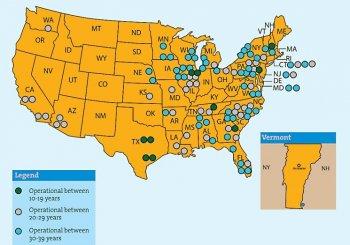The Environmental Defense Fund (EDF) started for one purpose—to ban DDT. It reached its goal in the sixties, resulting in banning of DDT across the country. It calls this milestone “one of the classic achievements of the environmental movement.” The venerable conservation group wants to connect with minority communities, and is actively recruiting people to help it do so.
The nonprofit has worked with African-American fishermen in the South Atlantic, learning about their problems, their identity, and their preferred solutions to solutions. It is helping restore Louisiana wetlands.
The national nonprofit organization links scientific, economic, legal, and private-sector entities in hopes of achieving solutions to environmental problems.
It is now recruiting two new fellows for its Tom Graff Fellowship Program (TGFP). The fellowship program was established last year to expand the diversity of EDF staff and the broader environmental community. It will be offering one-year paid positions to qualified candidates.
EDF was founded in 1967 by a group of scientists concerned about the effects of the pesticide DDT on wildlife, human health and the environment. DDT was used widely in the forties and fifties but was found to be toxic to marine and bird life such as eagles, falcons, hawks, shrimp, and crayfish and to be dangerous to human health.
Fellows will be working with EDF on one of their main focus areas—oceans, ecosystems, climate, or health. This year’s fellows will be based in Austin, Texas, San Francisco or Sacramento, California, and in Washington, D.C.
The Austin based project will be helping Austin’s predominantly Hispanic-serving colleges and universities to coordinate with the public sector-focused Climate Corps program. The fellow will support the university as it seeks new funding sources and media opportunities for these projects.
The second position, based in California, will be working with San Joaquin Valley low-income communities to solve California’s controversial and politically charged water conflicts. The position includes performing research, community outreach, and policy making.
The Washington, D.C., program is about working with communities who manage productive forest and agricultural ecosystems in Mexico. That nation has an emerging program of reduced deforestation and reforestation. The goal is to develop effective education models and implementation systems.
Some of the other achievements of the organization include developing market-based systems to cut pollution, persuading corporations of the benefits of environmentally safe practices, and helping landowners restore more than 2 million acres of habitat for endangered species, according to its website.
The nonprofit has worked with African-American fishermen in the South Atlantic, learning about their problems, their identity, and their preferred solutions to solutions. It is helping restore Louisiana wetlands.
The national nonprofit organization links scientific, economic, legal, and private-sector entities in hopes of achieving solutions to environmental problems.
It is now recruiting two new fellows for its Tom Graff Fellowship Program (TGFP). The fellowship program was established last year to expand the diversity of EDF staff and the broader environmental community. It will be offering one-year paid positions to qualified candidates.
EDF was founded in 1967 by a group of scientists concerned about the effects of the pesticide DDT on wildlife, human health and the environment. DDT was used widely in the forties and fifties but was found to be toxic to marine and bird life such as eagles, falcons, hawks, shrimp, and crayfish and to be dangerous to human health.
Fellows will be working with EDF on one of their main focus areas—oceans, ecosystems, climate, or health. This year’s fellows will be based in Austin, Texas, San Francisco or Sacramento, California, and in Washington, D.C.
The Austin based project will be helping Austin’s predominantly Hispanic-serving colleges and universities to coordinate with the public sector-focused Climate Corps program. The fellow will support the university as it seeks new funding sources and media opportunities for these projects.
The second position, based in California, will be working with San Joaquin Valley low-income communities to solve California’s controversial and politically charged water conflicts. The position includes performing research, community outreach, and policy making.
The Washington, D.C., program is about working with communities who manage productive forest and agricultural ecosystems in Mexico. That nation has an emerging program of reduced deforestation and reforestation. The goal is to develop effective education models and implementation systems.
Some of the other achievements of the organization include developing market-based systems to cut pollution, persuading corporations of the benefits of environmentally safe practices, and helping landowners restore more than 2 million acres of habitat for endangered species, according to its website.

